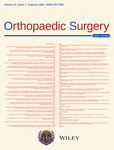
General Orthopaedics
IV TXA Reduces Blood Loss and Transfusion Need in Intertrochanteric Fracture Surgery using PFNA
Orthop Surg. 2019 Aug;11(4):635-642.One hundred patients scheduled for surgical treatment of an intertrochanteric fracture with a proximal femoral nail anti-rotation system were randomized to receive tranexamic acid (TXA) or no treatment for the reduction of blood loss and need for transfusion. The primary outcome of interest was estimated total blood loss. Additional outcomes of interest included intra-operative and hidden blood loss, levels of hemoglobin and hematocrit, transfusion rate, number of units of blood transfused, drainage volume and the incidence of complications. Follow up was performed up to 1 month post-operation. Results revealed significantly lower estimated total blood loss, intra-operative blood loss and hidden blood loss in the TXA group compared to the control group. Hemoglobin and hematocrit levels in the first post-operative day were significantly in favour of the TXA group compared to the control group. Whilst the incidence of transfusion was significantly lower in the TXA group compared to the control group, there were no significant differences between the two group in the mean number of units of blood transfused. No significant differences between the two groups were observed in drainage volume or the incidence of complications.
Unlock the full article
Get unlimited access to OrthoEvidence with a free trial
Start TrialCritical appraisals of the latest, high-impact randomized controlled trials and systematic reviews in orthopaedics
Access to OrthoEvidence podcast content, including collaborations with the Journal of Bone and Joint Surgery, interviews with internationally recognized surgeons, and roundtable discussions on orthopaedic news and topics
Subscription to The Pulse, a twice-weekly evidence-based newsletter designed to help you make better clinical decisions
Exclusive access to original content articles, including in-house systematic reviews, and articles on health research methods and hot orthopaedic topics
Or continue reading this full article
Register Now

Subscribe to "The Pulse"
Evidence-Based Orthopaedics direct to your inbox.




































